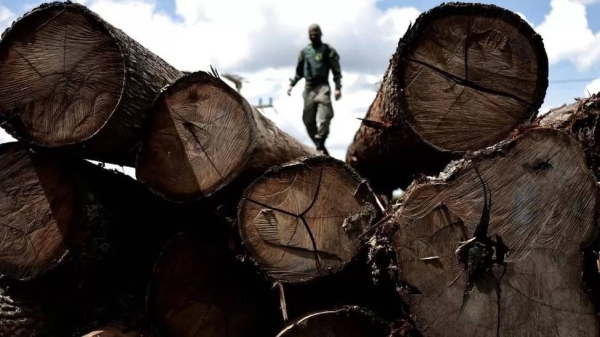
Three of the world’s biggest food businesses have been accused of buying soya from a farmer linked to illegal deforestation in the Brazilian Amazon.
Cargill, Bunge and Cofco sourced soya beans from the Chinese-owned Fiagril and the multinational Aliança Agrícola do Cerrado, both of which have allegedly been supplied by a farmer fined and sanctioned multiple times after destroying swathes of rainforest, according to a new investigation.
Soya beans are a key ingredient in poultry, pig and cattle feed, particularly for animals reared on intensive farms.
The fate of the Amazon is the subject of intense focus as world leaders scramble to agree on how to tackle the climate emergency. Research published in the academic journal Nature Climate Change last month found the area deforested in the Amazon almost quadrupled in 2019 – President Bolsonaro’s first year in power – compared with the year before.
The Bureau of Investigative Journalism (TBIJ), Unearthed and Repórter Brasil used satellite images and enforcement records to uncover how soya was planted on land that had previously been placed under embargo – a form of government ban that stops farmers found to have breached deforestation rules or caused other environmental damage using parts of their land.
At least 15 sq km of forest registered to a farmer supplying soya to Aliança and Fiagril was embargoed in 2019 by Brazil’s environmental regulator Ibama after being deforested. A separate embargo, issued by Mato Grosso’s state environment agency in 2016, names the same farmer in relation to further illegal deforestation.
Using satellite analysis from MapBiomas, Repórter Brasil established that soya was illegally grown on this land in 2018 and 2019, despite the embargo. Public records show that the farmer has been fined a total of R$12m (£1.3m) for breaches of forest protection rules – the fines were in 2013 and 2019.
The farmer, based in the remote Marcelândia region of Brazil’s Mato Grosso state, allegedly sold soya to Fiagril and Aliança in 2019 after the government embargo on the land. Bunge bought soya from Fiagril, and Cargill and Cofco purchased soya from Aliança, after the two companies had been supplied by the farm in 2019, according to records seen by TBIJ.
Fiagril and Aliança, as well as Cargill, Bunge and Cofco, are signatories to the soya moratorium. Signatories commit to not “sell, purchase and finance soya from areas deforested in the Amazon biome after July 2008”.
However, the companies can legitimately buy soya from the farm because it is the land that is embargoed rather than the entire farm or farmer. It is not known if the soya bought by Fiagril and Aliança came from prohibited land.
The moratorium’s monitoring system is understood to usually only prohibit the land where the breaches occurred, excluding other properties owned by the same farmer.
“Allowing different properties operated by the same person or group to follow different rules opens a loophole that farmers can use to circumvent the soy moratorium,” said Lisa Rausch, a researcher at the University of Wisconsin.
Fiagril told TBIJ that it condemns illegal activity and is “committed to the legal enforcement of sustainability in agriculture with our clients and suppliers”. The company denied sourcing soya from the embargoed farm.
Aliança said it was regularly audited and in compliance with all regulations and that “there are no facts or official rulings that mention, connect or in any other way refer to Aliança in any environmental violations”. The company said it deals with “countless farmers and producers in Brazil” and “businesses outside of Aliança’s control remain within the sole responsibility of a particular farmer/producer”.
Cargill said it did not source soya “directly” from the farm. It added: “We have firmly upheld the Brazilian soy moratorium in the Amazon since 2006 … We will investigate Fiagril and Aliança do Cerrado in accordance with our soy grievance process.”
Bunge said it has not bought soya beans from Aliança since 2017, and that Fiagril had not supplied them with soya beans from the Marcelândia region. “As a signatory of the Amazon soy moratorium, purchases made by Fiagril are audited by independent entities. In addition, Bunge’s contracts with suppliers have clauses in which the supplier expressly commits to supply grains in accordance with the applicable legislation, including environmental laws,” the company said.
Cofco said: “We conduct monthly internal audits, as well as annual external audits, on suppliers’ compliance with the moratorium. The 2019 audit confirmed that all our suppliers complied with moratorium requirements in the past season.”












